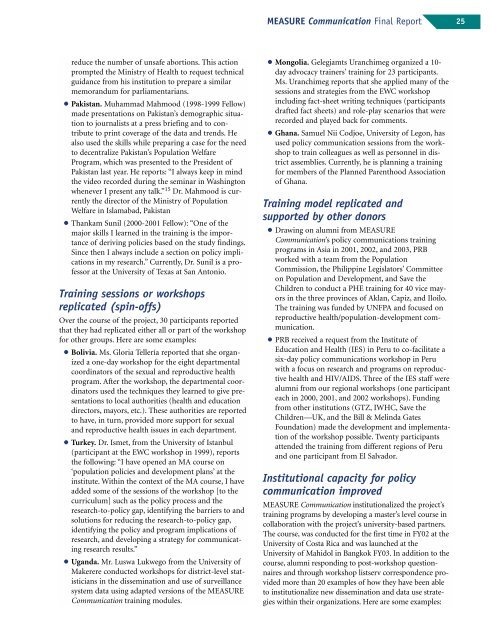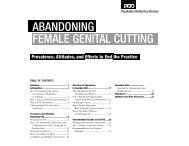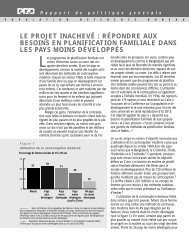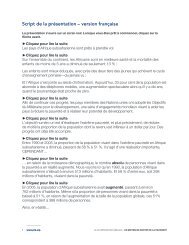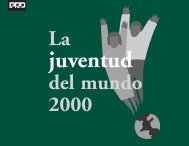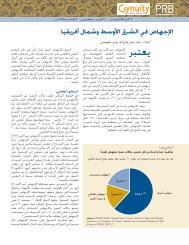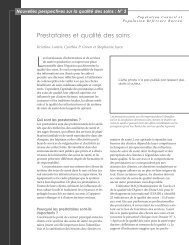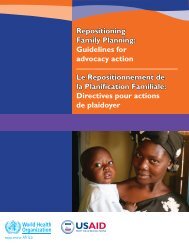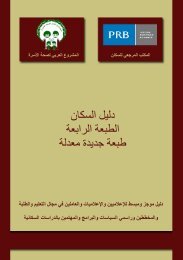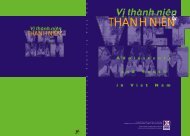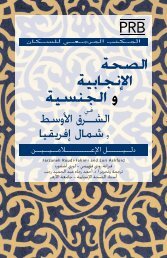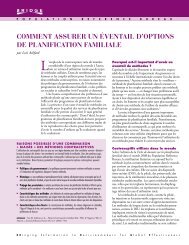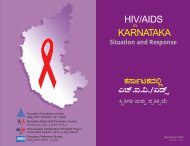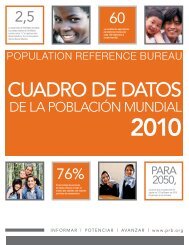MEASURE Communication Final Report - Population Reference ...
MEASURE Communication Final Report - Population Reference ...
MEASURE Communication Final Report - Population Reference ...
Create successful ePaper yourself
Turn your PDF publications into a flip-book with our unique Google optimized e-Paper software.
<strong>MEASURE</strong> <strong>Communication</strong> <strong>Final</strong> <strong>Report</strong><br />
25<br />
reduce the number of unsafe abortions. This action<br />
prompted the Ministry of Health to request technical<br />
guidance from his institution to prepare a similar<br />
memorandum for parliamentarians.<br />
● Pakistan. Muhammad Mahmood (1998-1999 Fellow)<br />
made presentations on Pakistan’s demographic situation<br />
to journalists at a press briefing and to contribute<br />
to print coverage of the data and trends. He<br />
also used the skills while preparing a case for the need<br />
to decentralize Pakistan’s <strong>Population</strong> Welfare<br />
Program, which was presented to the President of<br />
Pakistan last year. He reports: “I always keep in mind<br />
the video recorded during the seminar in Washington<br />
whenever I present any talk.” 15 Dr. Mahmood is currently<br />
the director of the Ministry of <strong>Population</strong><br />
Welfare in Islamabad, Pakistan<br />
● Thankam Sunil (2000-2001 Fellow): “One of the<br />
major skills I learned in the training is the importance<br />
of deriving policies based on the study findings.<br />
Since then I always include a section on policy implications<br />
in my research.” Currently, Dr. Sunil is a professor<br />
at the University of Texas at San Antonio.<br />
Training sessions or workshops<br />
replicated (spin-offs)<br />
Over the course of the project, 30 participants reported<br />
that they had replicated either all or part of the workshop<br />
for other groups. Here are some examples:<br />
● Bolivia. Ms. Gloria Tellería reported that she organized<br />
a one-day workshop for the eight departmental<br />
coordinators of the sexual and reproductive health<br />
program. After the workshop, the departmental coordinators<br />
used the techniques they learned to give presentations<br />
to local authorities (health and education<br />
directors, mayors, etc.). These authorities are reported<br />
to have, in turn, provided more support for sexual<br />
and reproductive health issues in each department.<br />
● Turkey. Dr. Ismet, from the University of Istanbul<br />
(participant at the EWC workshop in 1999), reports<br />
the following: “I have opened an MA course on<br />
‘population policies and development plans’ at the<br />
institute. Within the context of the MA course, I have<br />
added some of the sessions of the workshop [to the<br />
curriculum] such as the policy process and the<br />
research-to-policy gap, identifying the barriers to and<br />
solutions for reducing the research-to-policy gap,<br />
identifying the policy and program implications of<br />
research, and developing a strategy for communicating<br />
research results.”<br />
● Uganda. Mr. Luswa Lukwego from the University of<br />
Makerere conducted workshops for district-level statisticians<br />
in the dissemination and use of surveillance<br />
system data using adapted versions of the <strong>MEASURE</strong><br />
<strong>Communication</strong> training modules.<br />
● Mongolia. Gelegjamts Uranchimeg organized a 10-<br />
day advocacy trainers’ training for 23 participants.<br />
Ms. Uranchimeg reports that she applied many of the<br />
sessions and strategies from the EWC workshop<br />
including fact-sheet writing techniques (participants<br />
drafted fact sheets) and role-play scenarios that were<br />
recorded and played back for comments.<br />
● Ghana. Samuel Nii Codjoe, University of Legon, has<br />
used policy communication sessions from the workshop<br />
to train colleagues as well as personnel in district<br />
assemblies. Currently, he is planning a training<br />
for members of the Planned Parenthood Association<br />
of Ghana.<br />
Training model replicated and<br />
supported by other donors<br />
● Drawing on alumni from <strong>MEASURE</strong><br />
<strong>Communication</strong>’s policy communications training<br />
programs in Asia in 2001, 2002, and 2003, PRB<br />
worked with a team from the <strong>Population</strong><br />
Commission, the Philippine Legislators’ Committee<br />
on <strong>Population</strong> and Development, and Save the<br />
Children to conduct a PHE training for 40 vice mayors<br />
in the three provinces of Aklan, Capiz, and Iloilo.<br />
The training was funded by UNFPA and focused on<br />
reproductive health/population-development communication.<br />
● PRB received a request from the Institute of<br />
Education and Health (IES) in Peru to co-facilitate a<br />
six-day policy communications workshop in Peru<br />
with a focus on research and programs on reproductive<br />
health and HIV/AIDS. Three of the IES staff were<br />
alumni from our regional workshops (one participant<br />
each in 2000, 2001, and 2002 workshops). Funding<br />
from other institutions (GTZ, IWHC, Save the<br />
Children—UK, and the Bill & Melinda Gates<br />
Foundation) made the development and implementation<br />
of the workshop possible. Twenty participants<br />
attended the training from different regions of Peru<br />
and one participant from El Salvador.<br />
Institutional capacity for policy<br />
communication improved<br />
<strong>MEASURE</strong> <strong>Communication</strong> institutionalized the project’s<br />
training programs by developing a master’s level course in<br />
collaboration with the project’s university-based partners.<br />
The course, was conducted for the first time in FY02 at the<br />
University of Costa Rica and was launched at the<br />
University of Mahidol in Bangkok FY03. In addition to the<br />
course, alumni responding to post-workshop questionnaires<br />
and through workshop listserv correspondence provided<br />
more than 20 examples of how they have been able<br />
to institutionalize new dissemination and data use strategies<br />
within their organizations. Here are some examples:


